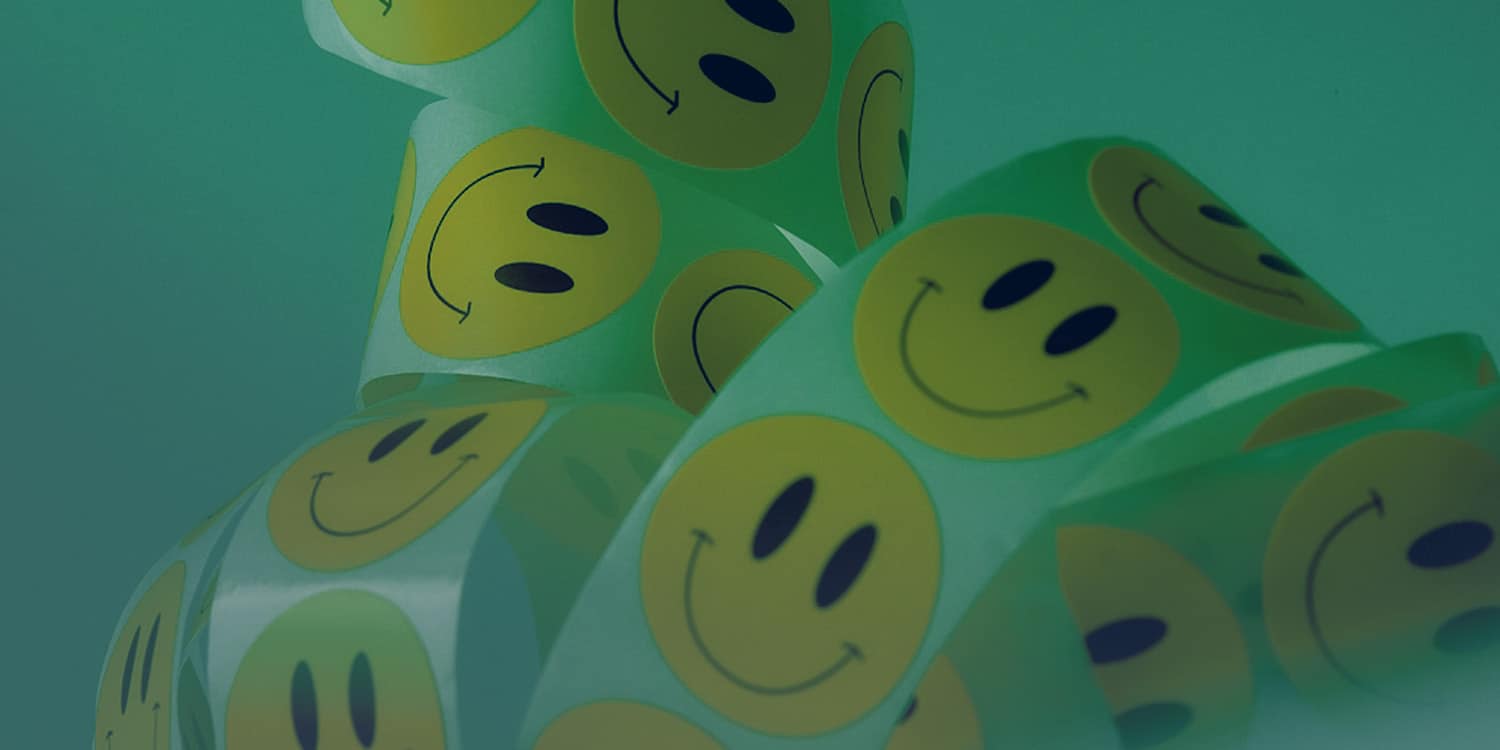Lately, everyone is cold-plunging themselves into an icey bliss. Steaming themselves in home saunas. Taking double-digit and increasingly esoteric wellness supplements. Pushing their consciousness to its limits at psychedelic retreats. Biohacking their way to immortality. Losing their bodies in sensory deprivation tanks or darkness retreats. Meditating regularly and seeing breathwork coaches. Attending healing sound baths. Downing Athletic Greens. Binging nootropics. Intermittent fasting.
You’ve probably seen all this online, if not done some of it in real life. And you’ve probably also noticed how our culture is encouraging us all to “put our own oxygen masks on first,” as the saying goes. After the mental health and self-care revolutions of the past decade, not to mention the psychological magnifying glass of the pandemic, we’re all doing the work. Self work has become the new workism, characterized by the same ferocious zeal.
Today, those on dating apps report they don’t want to go out with people who aren’t in therapy. That’s right, the latest deal breaker in the dating market is inadequate attention to the self. Vulnerability is the new black.
The fashion of our times is to let it all hang out in the public eye. Our cultural mantra is to “live your truth.” The trending mode of expression for influencers is to share what’s going on behind the scenes in their minds, effectively de-influencing and penetrating the sales facade. Authenticity has become the inescapable imperative of our time.
Such a deep focus on the self is key to understanding how social status works today. In 2022, Gallup found that Americans’ satisfaction with “the way things are going in my personal life” neared a 40-year high, even as their satisfaction with “the way things are going in the U.S.” neared a 40-year low. These are startling results, indicative of a profound shift in how we relate to ourselves and one another.
In a similar 2023 finding, The Wall Street Journal found that Americans have dramatically pulled back from our historically prosocial values.
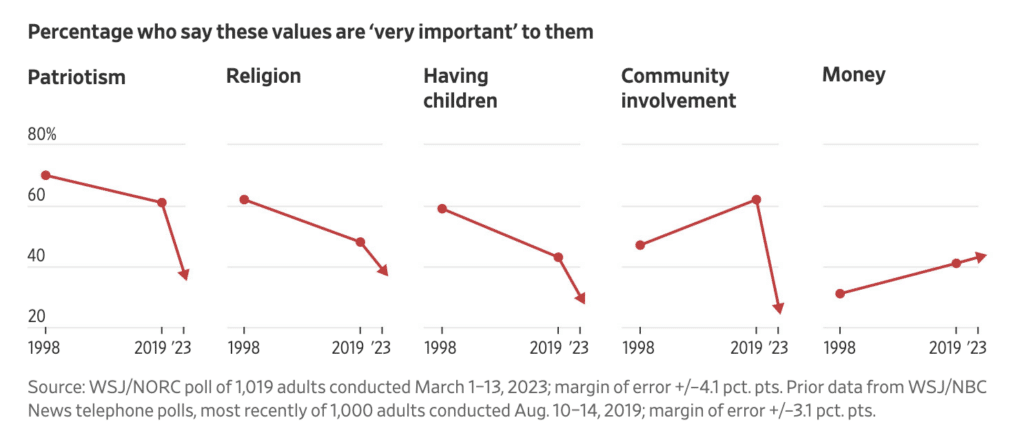
Taking stock, what’s clear is that we’re on an accelerating journey inwards. We’ve radically turned away from society and into the self, which has impacted the ways we seek to stand out and distinguish ourselves.
Status is no longer defined externally by the peacocking of conspicuous consumption; instead, it’s become defined by conspicuous commitment, by the deep, abiding belief in and commitment to a project of internal self-betterment.
We’re no longer bragging about our possessions, the experiences we’ve had or the moral highgrounds we’ve taken. Instead, we’re showing off our discipline and self-denial, our asceticism and the pains we’ve endured for physical and psychic gains.
How did we get here? We can’t blame it all on Goop. What happened to Escalades and Ibiza, to Birkin bags and “I voted” stickers?
In a society with diminished future hopes, the most prized commodity is the ability to transcend the nihilism and ironic detachment that is so in vogue. When the felt sense is that life’s prospects have been dimmed by a litany of societal factors, and when it’s so easy to criticize, tear down and take refuge in irony, earnestly committing to a disciplined project of self-improvement – wherever it’s directed – stands out. Deeply believing in something optimistic has become a new luxury that isn’t available to everyone.
This new form of status is most apparent in the therapeutic and wellness domains, but it’s also what’s behind the meteoric rise of psychedelics. It’s what’s fueling the elite’s obsession with longevity. And it’s what’s beneath the effusive glee of personal AI optimization efforts.
The Birth of Conspicuous Commitment
If you’re finding it harder to understand social status these days, you’re not alone. In his 2023 book, The Status Revelation, journalist and documentarian Chuck Thompson argues that “no one has any idea what status and prestige are anymore.” Thompson concludes that money can’t buy happiness, and increasingly, it doesn’t even buy status. Likewise, Vox has recently declared that shared trends – long the foundation of status displays – are dead.
Status hierarchies can’t survive the seismic social upheavals we’ve endured over the last decade. Agreement is no more: It’s been well-documented that society is breaking, that we’ve splintered into mutually hostile reality tunnels, that we’re fully post-truth, that it’s nothing but tribal factionalization.
These conclusions dovetail with recent research from my colleagues at Concept Bureau. CEO Jasmine Bina published a fascinating piece exploring the rise of High Fidelity Society, in which our stable, governing social conventions and identity-binaries have given way to a much more fine-grained multiplicity of social existences. Strategist Rebecca Johnson has argued that brands can no longer aspire towards mass relevance and broad appeal and instead need to focus on cultivating niche relatability to individual personalities.
Yet there is widespread cultural agreement that the long-term prospects of most individuals are diminishing. So, how do we cope? Create Tomorrow, a think tank of futurists, recently released their 2024 Future Consumer Report and one of their key predictions is the continued rise of what they’re calling “Tragic Optimism.”
The tragically-optimistic mindset is characterized by a more realistic framing of life that is closely connected with coping. We’re now wide-eyed and fully aware that the majority of us are moving into the future with more limited horizons and lessened prospects.
The cultural ubiquity of tragic optimism is the main reason why 91% of consumers want more humor, playfulness and absurdity from brands these days. Humor and irony speak to the lack of agency that many in society are feeling – if you can’t beat them, you can at least mock them.

Commitment, on the other hand, is wholeheartedly post-nihilist and post-ironic. It’s deeply earnest and sincere – it’s dead serious – and it requires the foil of tragic optimism to stand out as something different and rare, something capable of conferring status.
Conspicuous Commitment is The Fourth Turning of Status
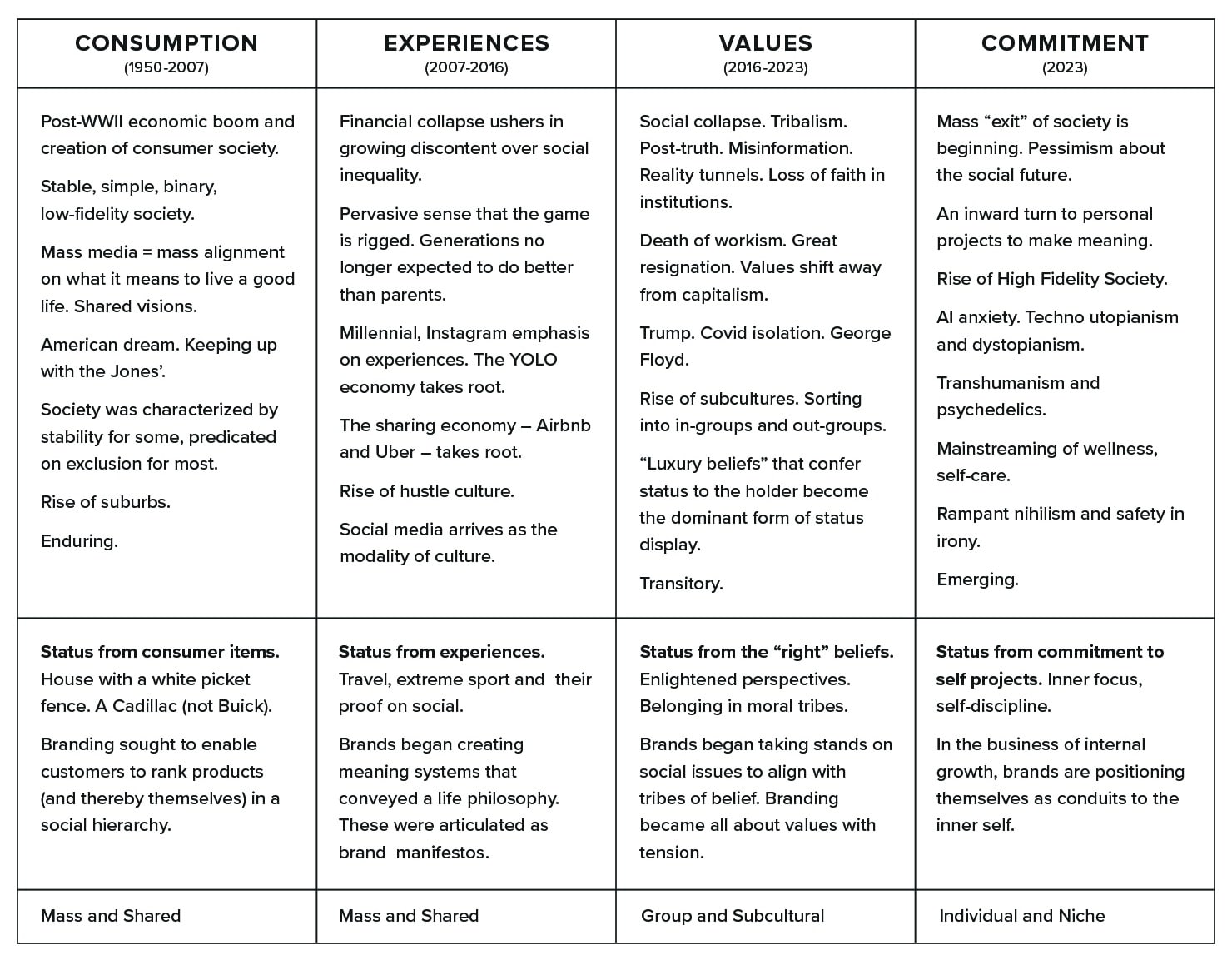
The post-war golden age of American capitalism ushered in the American dream. For decades, your worth was defined by what you had, and there was a clear hierarchy. The era of consumption-based status peaked in the early 2000’s, epitomized by MTV’s Cribs, which, incidentally, has just been rebooted. Already, cultural commentators are panning it, saying it won’t work because “wealth porn isn’t appealing anymore.”
Overt displays of wealth began to fade from fashion with the financial collapse of 2007. Millennials graduated into one of the worst job markets of all time and had their lifetime economic prospects dashed. Naturally, they began to assert a new value system that eschewed material wealth in favor of deeper meaning – or at least the appearance of it. Experiences in the service of better stories became the status currency as the YOLO economy took root and Instagram became, for a time, the mainvein of culture.
The dominance of experiences came to an end when society started to fully come apart in 2016. Even the carefree pursuit of experiences became contentious. Suddenly, your version of status wasn’t mine; it was what you believed about our breaking society that mattered. Beliefs about economic equality, inclusivity, climate change, the reality of white privilege, anti-capitalism, masks, non-monogamy and drug legalization began to confer tribal status. Psychologist Rob Henderson is the values era’s leading theorist with his concept of luxury beliefs.
In response to these developments, socially-conscious, values-based branding became the go-to tactic, even to the point of parody. In response to Unilever’s recent announcement that all 400 of its brands will soon be getting mission statements, The Wall Street Journal asked, somewhat rhetorically, “Does Your Mayo Need a Mission Statement?” Unilever’s move illustrates how commodified this mode of branding has become. Ultimately, this kind of branding ends up all sounding the same, squeezed as it is by the narrow limits of the universe of values.
Most companies haven’t realized that we’re moving beyond such prosocial cultural stances.
Varieties of Conspicuous Commitment
What all emerging forms of conspicuous commitment share is a consecration of the self. Conspicuous commitment puts self-discipline into evidence for all to see, and it transcends the irony, nihilism and tragic optimism our culture is mired in. We now gain status precisely from the internal world building we do. The stories we create about who we are, and most importantly, who we’re becoming, are the fundamental status currency today.
Variety One: Asceticism
Above all, today’s status displays are characterized by self-discipline and non-religious religiosity, by deep, non-ironic commitment to a personal project of the self.
They often look like pain. 75 hard is a great example. 75 hard is a “transformative mental toughness” program. Discipline is its product. 75 hard asks you to work out everyday, eat well, drink lots of water and forgo alcohol. Boastfully, the program announces that 95% of people who try 75 hard will fail. The hashtag #75hardchallenge has been viewed almost 1 billion times and #75hard has over 1.5 billion views on Tiktok.
The program’s founder, Anthony Frisella, asserts that “it takes confidence. It takes grit.
It takes belief in yourself. It takes fortitude. It takes endurance. It takes perseverance. It takes a willingness to win. These are NOT traits you are born with… “

This TikTok is a representative example. All the ingredients are there: “Shutting out” the world and going into the self to work on one’s mental landscape and body. Discipline, it turns out, is the missing piece of the interior jigsaw for many people in today’s culture.
Similarly, Wim Hof, founder of the Wim Hof Method, simplifies existence down to breathing and exposure to cold. In this system, there’s nothing that cold shock therapy and breathing can’t fix, and if someone commits to being a person in the Wim Hof way, they’re rewarded with “maximum energy, restful sleep, an uncluttered headspace, and a host of other benefits. It is a gym membership, mindfulness coach, and health insurance all rolled into one.”
Asceticism can also look like tidying up. Social media is increasingly filled with cleaning resets where people explain how they clean and reorganize their spaces; morning and evening “5-9” routines where people explain how they structure their daily routines; cabinet and pantry organization where people explain their systems for simplifying the chaos of daily life.
What all these trends express is the status derived from ordering thyself. The right amount of challenge allows us to feel like we’re becoming stronger, more disciplined, hardened and resilient people.
Variety Two: Immortality
A new techno-utopian longevity movement is forming that knits together biohacking and artificial intelligence. The movement’s most prominent evangelist is tech CEO Bryan Johnson, who is on a public quest to reverse the aging process and become the same biological age as his son.
Johnson is spending 2 million dollars a year and enlisted a team of 30 doctors to break the spell of aging. In his new venture, Blueprint, he aims to generate “aging escape velocity.”

Here is Johnson’s philosophy in his own words:
“The enemy is Entropy. The path is Goal Alignment via building your Autonomous Self; enabling compounded rates of progress to bravely explore the Zeroth Principle Future and play infinite games. This time, our time, right now – the early 21st century – will be defined by the radical evolution of intelligence: human, AI and biology. Our opportunity is to be this exciting future… You want as-perfect-as possible health? Get out of the way and let a system comprised of your body + science do the work. That’s counter intuitive. We are accustomed to thinking our minds are the solution; not the problem.”
His language, particularly in the selection I emphasized in bold, betrays earnest intent that is not hyperbolic. “Playing infinite games” speaks directly to the goal of immortality, and building “your autonomous self” via “goal alignment” shows a master command of the new language of conspicuous commitment.
The money is paying off. According to Johnson, he’s experienced: “5.1 yrs epigenetic age reversal; Reduced my pace of aging by the equivalent 31 years in 18 months; Now aging more slowly than the average 10 yr old.”
Johnson may be the most salient example of technologically-enabled biohacking at the moment, but he’s far from alone. The uber-wealthy questing towards immortality are merely the font of a much broader reservoir of people asserting agency and taking control of their bodies and minds. General understanding of longevity science and health are now mainstream, and laypeople are developing their own bespoke wellness stacks, trying to live for as long as they can.
Immortality is the undercurrent beneath many of the most hopeful AI future narratives popular among the likes of Johnson. A recent scan of headlines reveals a surge in articles about how AI is bringing humanity to the doorstep of immortality.
Prominent futurist and computer scientist Ray Kurzweil predicts we will effectively achieve immortality by 2030. Intelligence advances and nanotechnology are both vital for mapping our neural connectomes for digital life.
Much is uncertain here, but what is clear is that these technological advances will not be evenly distributed. When our lives’ length’s begin to diverge, longevity becomes the ultimate luxury good.
Variety Three: Psychedelic Spirituality
Going back decades, the frontier of scientific and spiritual exploration has been aimed outward at the horizon of the stars. Cultural storytelling and media narratives focused on colonizing the universe, a species in continual galactic expansion.
Yet the reality of exploration as it’s actually occurring tells a different story, one of inwardness. Author and science journalist Michael Pollan, in his 2019 book How to Change Your Mind, asserts that “psychedelics will be for the study of the mind what the microscope was for biology.”
Psychedelics are the perfect technology for the inward gaze at the heart of conspicuous commitment. The internal mining is now at full-throttle. We admire those who push their minds to the limits, diving deep inside to see what’s unearthed.
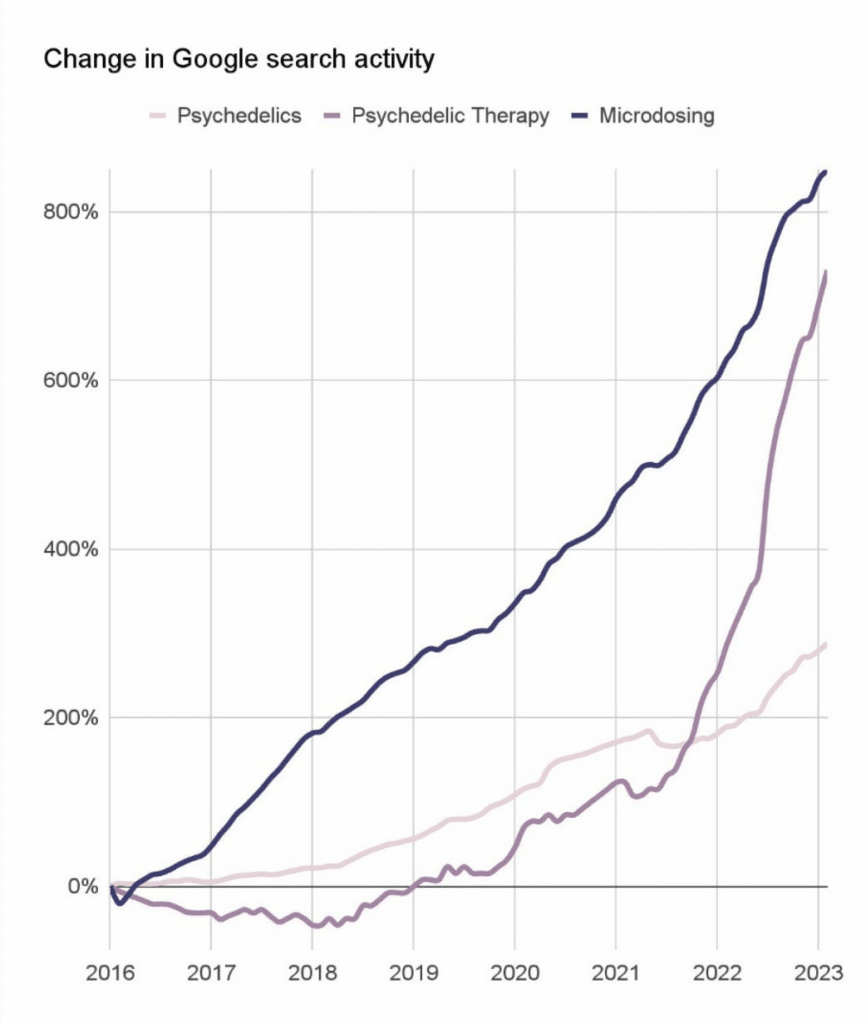
Ketamine therapy is now readily available in the mail, no special permissions required. Psilocybin (mushroom) therapy is available in a handful of blue states, and red states are now joining them in a push for general decriminalization outside of therapeutic contexts. And the U.S. Food and Drug Administration is moving toward legalizing MDMA for the treatment of post-traumatic stress disorder.
Soap brand Dr. Bronner’s recently made access to psychedelic-assisted psychotherapy a keystone wellness benefit available to all of its employees. Many other companies are sure to follow in their footsteps as we move into the future.
Yet psychedelics are not only in vogue as medicalized mental health treatment, they exist as a broader cultural force. As we shun traditional, mass religions, it’s never been more fashionable to be a spiritual seeker, creating meaning ad hoc and personally. The presence of these personally-defined meaning systems confers status in our new paradigm.
Conspicuous Commitment is Evidence of Culture in Transition
At first blush, it seems easy to regard conspicuous commitment cynically as a detached preoccupation of the elite, but that would be a mistake. Though individuals may remain mired in nihilism, cultures never do. The breakdown of our guiding social structures in rapid succession was never going to occur without a fallout, and our culture has begun the process of awakening from the meaning crisis.
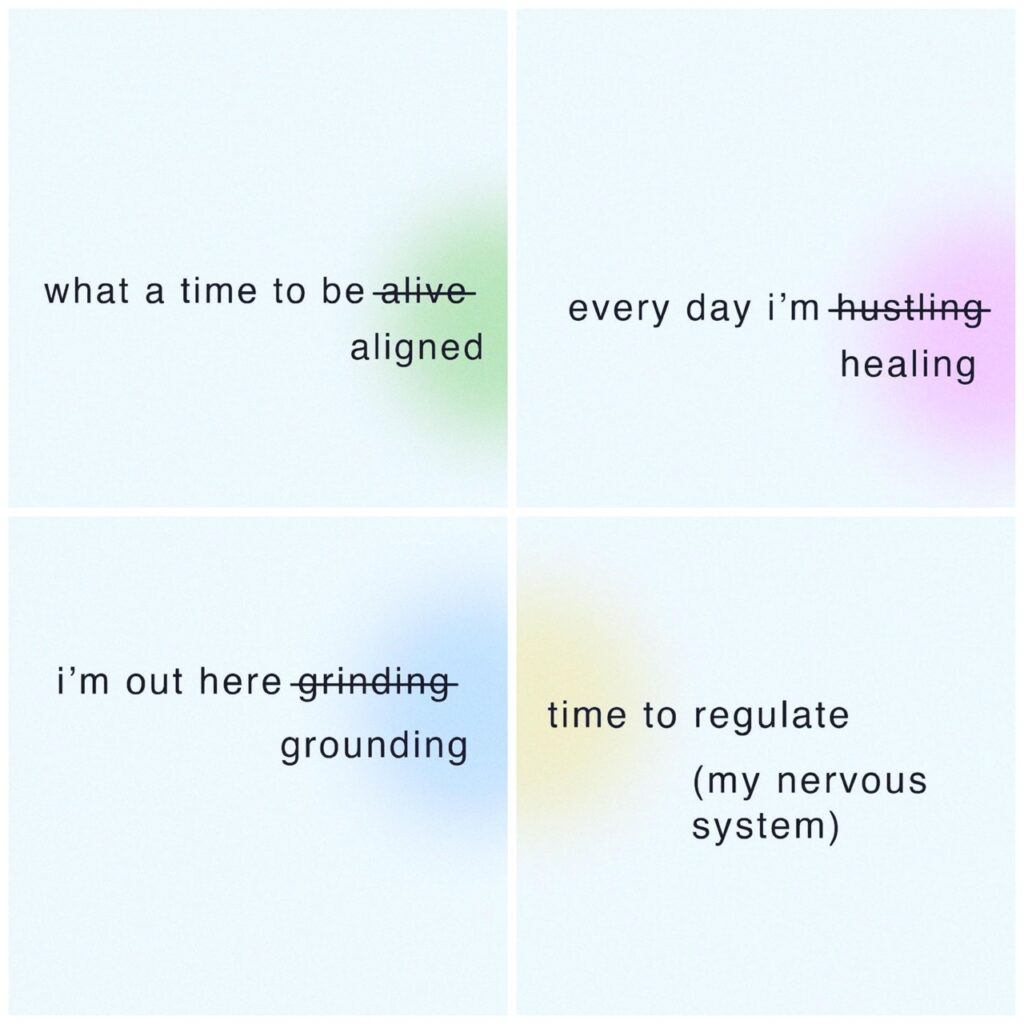
If the first step toward any kind of collective renewal is each of us putting our own oxygen mask on first, then so be it. Any therapist working will tell you self-work is an essential precondition. When we do begin to lay the foundations of our new social infrastructure, we can expect to re-engage each other on stronger, more honest ground.
The emergence of conspicuous commitment is the first stirring of a life beyond the consoling seductions of nihilism, the dopamine hacking of consumer excess and the comedic jestering of ironic detachment.
Conspicuous commitment gives the broader culture new ways to feel agency and to find genuine meaning in their lives. For the first time in a long time, it feels like something real, like the green shoots of an honest hope.
What we need most are new models of what a generative, blossoming life looks like. If 75 hard, biohacking, or psychedelics aren’t for you, rest assured there will soon be many other models for living a committed, meaningful life.
We should expect a profusion of different ways to commit, and brands will likely start distinguishing themselves – counterintuitively – by the challenges they present. When ease is everywhere, “difficult, but worth it” is not. Commitment is particularly suitable for finance, wellness, food, athletics, arts, and hobby pursuits, but there’s really no category where it can’t show up.
What’s abundantly clear – dare I say hopeful – is that we’re a culture in transition, hellbent on repopulating our worlds with the meaning systems of a more disciplined existence.

